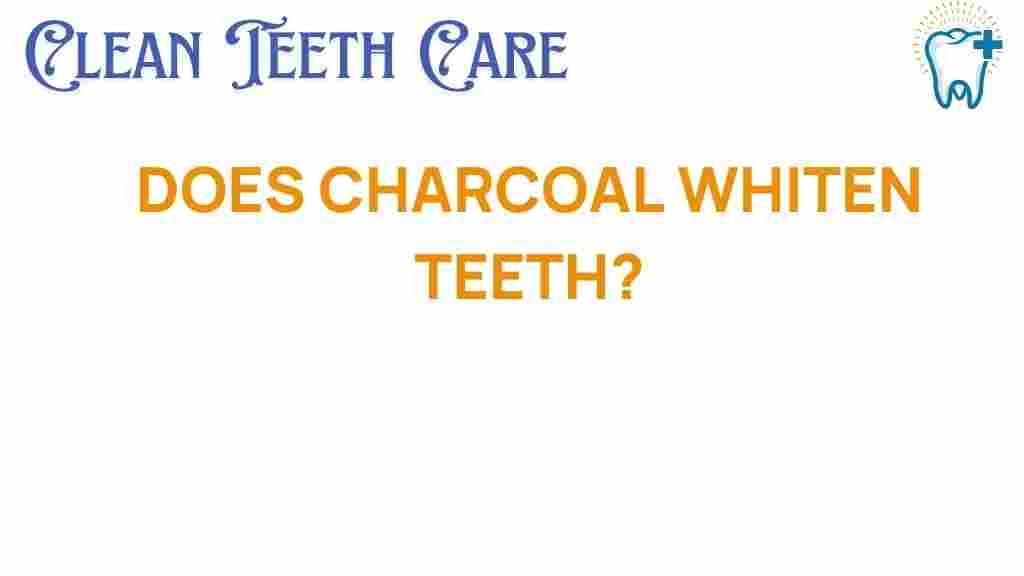The Truth Behind Charcoal: Does It Really Whiten Teeth?
In recent years, charcoal has taken the beauty and health industry by storm, becoming a popular ingredient in various products, particularly in the realm of teeth whitening. With claims that it effectively brightens smiles and enhances oral hygiene, many are curious about the real effectiveness of this natural remedy. In this article, we will explore the myths surrounding charcoal, its effectiveness in dental care, and whether or not it truly delivers on its promises.
What is Charcoal?
Charcoal, specifically activated charcoal, is a form of carbon that has been treated to increase its adsorption properties. This means it can trap toxins and chemicals, which is why it’s often used in various health and beauty products, including those aimed at teeth whitening.
Understanding Teeth Whitening
Teeth whitening is a process that aims to lighten the color of teeth and remove stains. Common methods include:
- Whitening toothpaste
- Over-the-counter whitening strips
- Professional dental treatments
- Natural remedies like charcoal
When it comes to natural remedies, charcoal has gained popularity due to its perceived safety and effectiveness. But how does it stack up against traditional whitening methods?
Examining the Effectiveness of Charcoal for Teeth Whitening
Many beauty products now include charcoal, making it a trendy ingredient in health trends. However, the effectiveness of charcoal in teeth whitening is still debated. Here are some points to consider:
How Charcoal Works
Proponents claim that activated charcoal works by:
- Adsorbing plaque and stains from the surface of teeth
- Neutralizing bad breath
- Promoting overall oral hygiene
While these claims sound promising, scientific evidence supporting the whitening effects of charcoal is limited. Most studies focus on its ability to adsorb toxins, not specifically on its whitening abilities.
Potential Benefits of Charcoal
Some potential benefits of using charcoal for dental care include:
- Natural ingredient: Being a natural remedy, it appeals to those looking for organic alternatives.
- Affordable: Charcoal products are often less expensive than professional whitening treatments.
- Easy to use: Many charcoal toothpaste and powders can be easily incorporated into your daily routine.
Potential Risks of Using Charcoal
Despite the potential benefits, there are several risks associated with using charcoal for teeth whitening:
- Enamel Erosion: Charcoal can be abrasive, potentially leading to enamel erosion over time.
- Gum Irritation: Some users report gum sensitivity or irritation.
- Staining: If not rinsed properly, charcoal can lead to staining on dental work or around the gums.
Myths About Charcoal and Teeth Whitening
There are many myths surrounding the use of charcoal for oral hygiene. Here are a few:
- Myth 1: Charcoal is an effective substitute for regular toothpaste.
- Myth 2: Charcoal can whiten teeth overnight.
- Myth 3: All charcoal products are safe for teeth.
It’s important to differentiate fact from fiction when considering the use of charcoal in your dental care routine.
Step-by-Step Guide to Using Charcoal for Teeth Whitening
If you decide to give charcoal a try for teeth whitening, here’s a simple step-by-step guide:
- Choose the Right Product: Look for activated charcoal toothpaste or powders specifically designed for oral hygiene.
- Brush Gently: Apply a small amount of charcoal to your toothbrush and brush gently to avoid enamel erosion.
- Limit Frequency: Use charcoal products only 1-2 times a week to minimize potential damage to enamel.
- Rinse Thoroughly: After brushing, rinse thoroughly with water to remove any residual charcoal.
- Follow with Regular Toothpaste: It’s advisable to follow up with regular fluoride toothpaste to ensure proper dental care.
Troubleshooting Tips
If you experience any issues while using charcoal for teeth whitening, consider the following tips:
- Stop Use if Irritation Occurs: If you notice any gum irritation or sensitivity, discontinue use immediately.
- Consult Your Dentist: Always check with your dentist before incorporating new products into your dental care routine.
- Monitor Results: Keep track of any changes in your teeth and gums to assess the effectiveness of the product.
Alternatives to Charcoal for Teeth Whitening
If you’re hesitant to use charcoal, there are several other options for teeth whitening:
- Whitening Toothpaste: Formulated with special ingredients to help remove stains.
- Whitening Strips: Over-the-counter products that provide a more controlled whitening experience.
- Professional Treatments: Consult your dentist for in-office whitening options for immediate results.
Choosing the right method will depend on your individual needs and preferences.
Conclusion
While charcoal has gained a reputation as a trendy ingredient in beauty products and natural remedies, its effectiveness as a teeth whitening solution remains questionable. Though some people may find it beneficial for their oral hygiene, the potential risks, including enamel erosion and gum irritation, should not be overlooked.
If you are considering charcoal as part of your dental care routine, it’s essential to proceed with caution and consult with your dentist. For those seeking proven results, traditional whitening methods may be safer and more effective.
Ultimately, maintaining a good oral hygiene routine, including regular brushing, flossing, and dental check-ups, is crucial for achieving and maintaining a bright, healthy smile. For more information on safe dental practices, visit this comprehensive guide.
In the ever-evolving world of health and beauty trends, staying informed is key. Whether you choose to incorporate charcoal into your regimen or opt for traditional methods, understanding the implications is vital for your overall dental health.
This article is in the category Treatments and created by CleanTeethCare Team
